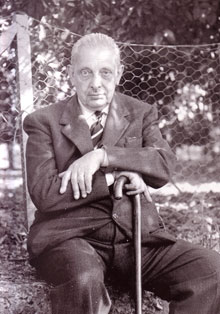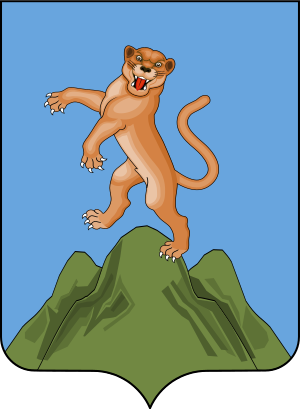Giuseppe Tomasi di Lampedusa facts for kids
Quick facts for kids Don Giuseppe Tomasi |
|
|---|---|
| Prince of Lampedusa Duke of Palma Grandee of Spain |
|
 |
|
| Born | 23 December 1896 Palermo, Sicily, Kingdom of Italy |
| Died | 23 July 1957 (aged 60) Rome, Lazio, Italy |
| Spouse | Alexandra von Wolff-Stomersee |
Giuseppe Tomasi di Lampedusa (born December 23, 1896 – died July 23, 1957) was an Italian writer. He was also the last Prince of Lampedusa, a noble title.
He is most famous for his only novel, Il Gattopardo. This book was published after he died in 1958. The story takes place in his home region of Sicily during a time called the Risorgimento. This was when Italy became one country.
Giuseppe was a quiet and private person. He spent a lot of time reading and thinking. He once said, "I was a boy who liked solitude, who preferred the company of things to that of people."
Contents
Giuseppe's Early Life and Education
Giuseppe Tomasi was born in Palermo, Sicily. His father was Giulio Maria Tomasi, the Prince of Lampedusa. His mother was Beatrice Mastrogiovanni Tasca Filangieri di Cutò.
Giuseppe became an only child when his sister Stefania died in 1897. He was very close to his mother, who was a strong person. She taught him French. His father was not as warm or involved.
As a child, Giuseppe studied at home in Palermo. He had a tutor who taught him literature and English. His grandmother read him adventure novels by Emilio Salgari. In their small theater at their vacation home, he first saw a play called Hamlet.
School and Military Service
In 1911, Giuseppe started attending high school in Rome and later in Palermo. In 1915, he moved to Rome and began studying law at university.
However, that same year, he joined the army. He fought in World War I and was captured by the Austro-Hungarian army. He was held in a prison camp in Hungary. Luckily, he managed to escape and return to Italy.
After leaving the army, he went back to Sicily. He spent time resting and traveling with his mother. He also continued to study books from other countries. During this time, he started thinking about his future novel, The Leopard. He first planned for the whole story to happen in just one day.
Family Life and Later Years
In 1932, Giuseppe married Alexandra von Wolff-Stomersee in Riga. She was a noblewoman from the Baltic region and studied how the mind works. They called her "Licy." Their wedding was in an Orthodox church.
They first lived with Giuseppe's mother in Palermo. But his mother and Licy did not get along well. So, Licy soon moved back to Riga.
Becoming a Prince and War Time
In 1934, Giuseppe's father passed away. Giuseppe then inherited his father's title and became the Prince of Lampedusa.
He was called back to the army briefly in 1940 during World War II. But because he owned a large farm, he was soon sent home to manage it. He and his mother found safety in Capo d'Orlando. There, he was reunited with Licy. They survived the war, but their family palace in Palermo was destroyed.
After his mother died in 1946, Giuseppe and his wife Licy moved back to Palermo.
Writing The Leopard
In 1953, Giuseppe started spending time with a group of young thinkers. One of them was Gioacchino Lanza Tomasi, a cousin. Giuseppe became very close to Gioacchino. The next year, he officially adopted him as his son.
Giuseppe often visited his cousin, the poet Lucio Piccolo. In 1954, they traveled together to a literary awards event. There, Giuseppe met famous writers like Eugenio Montale.
It is said that after this trip, he started writing Il Gattopardo (The Leopard). He finished the book in 1956. While he was alive, two publishers rejected his novel.
Death and Posthumous Success
In 1957, Giuseppe Tomasi di Lampedusa was diagnosed with lung cancer. He died on July 23 in Rome. After a funeral service, he was buried in the Capuchin cemetery in Palermo.
His novel, Il Gattopardo, was published the year after he died. A writer named Elena Croce had sent it to another writer, Giorgio Bassani. Bassani then showed it to the Feltrinelli publishing house.
Il Gattopardo was quickly recognized as a very important Italian book. In 1959, Giuseppe Tomasi di Lampedusa was given the famous Strega Prize for his novel, after his death.
Giuseppe Tomasi's Famous Works
Il Gattopardo tells the story of the noble Salina family in Sicily. It shows how they dealt with the big changes during the Risorgimento.
One of the most famous lines in the book is spoken by Don Fabrizio's nephew, Tancredi. He tells his uncle, "Unless we ourselves take a hand now, they'll foist a republic on us. If we want things to stay as they are, things will have to change." This idea, where you change things to keep them mostly the same, is sometimes called the di Lampedusa strategy.
The Italian title Il Gattopardo means "The Leopard" in English. But the word gattopardo actually refers to a type of wild cat like the ocelot or serval. It might refer to a wildcat that died out in Italy around the mid-1800s. This is like how the noble families in the book were slowly losing their power.
In 1963, Il Gattopardo was made into a movie. It was directed by Luchino Visconti and starred Burt Lancaster. The film won a top award at the Cannes Film Festival.
Giuseppe also wrote other works, though they are less known:
- I racconti (Stories), published in 1961, which includes a short novel called The Professor and the Siren.
- Le lezioni su Stendhal (Lessons on Stendhal), published in 1977.
- Invito alle lettere francesi del Cinquecento (Introduction to sixteenth-century French literature), published in 1970.
- In 2010, a collection of his letters was published in English as Letters from London and Europe.
He wrote many thoughtful comments on English and other foreign books. These writings make up a larger part of his work than his stories.
Giuseppe Tomasi's Legacy
An asteroid named 14846 Lampedusa was named after him.
In 2019, a Canadian writer named Steven Price wrote a novel about Giuseppe Tomasi di Lampedusa's life. It is called Lampedusa.
Titles and Family Crest
Giuseppe Tomasi had a long noble title:
Don Giuseppe Tomasi, 11th Prince of Lampedusa, 12th Duke of Palma, Baron of Montechiaro, Baron of La Torretta, and Grandee of Spain of the first class
See also
 In Spanish: Giuseppe Tomasi di Lampedusa para niños
In Spanish: Giuseppe Tomasi di Lampedusa para niños
 | Georgia Louise Harris Brown |
 | Julian Abele |
 | Norma Merrick Sklarek |
 | William Sidney Pittman |


